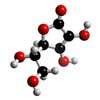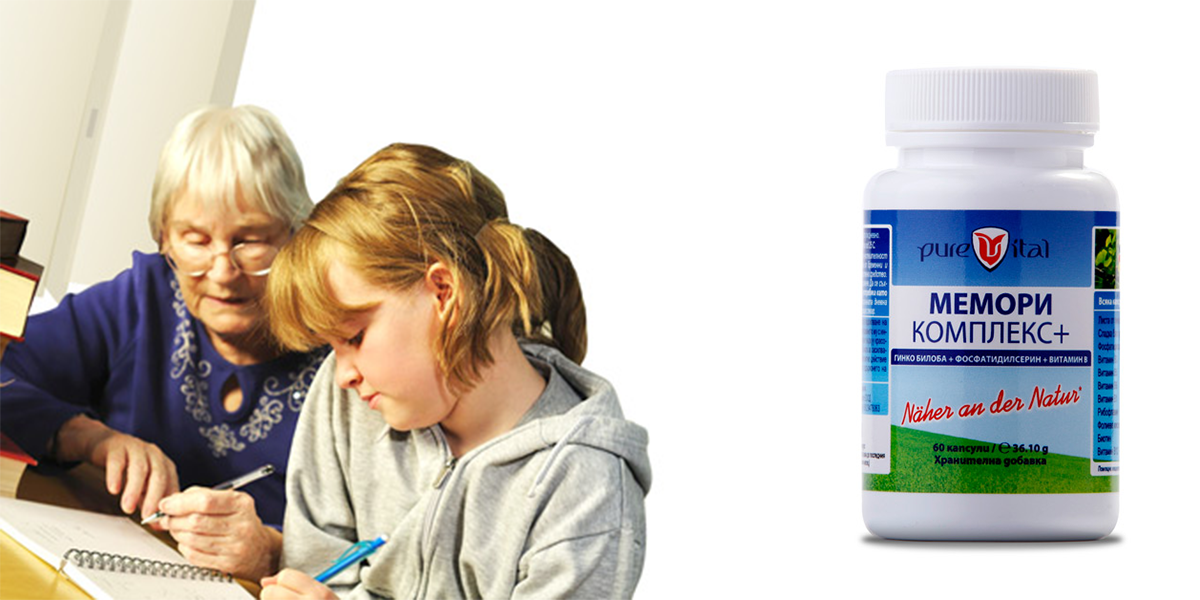The recommended daily dose contains:
- Ginkgo Biloba 320,000 mg
- Phosphatidylserine 20% 30,000 mg
- Vitamin B3 18,000 mg
- Vitamin B5 6,522 mg
- Vitamin B6 2,440 mg
- Vitamin B1 1,944 mg
- Vitamin B2 1,600 mg
- Folic acid 0,200 mg
- Biotin (Vitamin B7) 0,150 mg
- Vitamin B12 0,100 mg
Ginkgo Biloba
Ginkgo Biloba (Ginkgo Biloba) is one of the most ancient tree species on Earth. This tree is the only living representative of the Ginkgoales - an extinct group of seed plants, and is therefore also known as a "living fossil". Nowadays, the leaves of the tree are mainly used. They are rich in the most desirable ingredients (ginkoglides, terpene lactones) and poor in undesirable substances (especially ginkolic acids). Ginkgo flavonoids directly dilate the smallest blood vessels, increasing the speed of blood flow in them, blood circulation and oxygen levels throughout the body, but especially in the brain. Better blood circulation has a positive effect on all ailments due to insufficient blood supply and especially vertigo and tinnitus. In addition, the intake of Ginkgo Biloba improves the ability to think and memory and slows down the aging of the brain, reduces fatigue, increases concentration and work capacity. Ginkgo Biloba also prevents harmful changes in cells and prevents the formation of atherosclerotic plaques on the inner walls of blood vessels. According to recent studies, the herb prevents and successfully fights Alzheimer's disease as well.
Although the mass of the brain is only 2% of that of the whole body, this organ consumes 20% of the received oxygen. The brain uses oxygen through a complex network of blood vessels and capillaries. As we age, cerebral circulation slows and less nutrients and oxygen, which are responsible for normal neurological functions, reach the brain.
Ginkgo Biloba contains specific phytonutrients that support blood circulation and the supply of oxygen to the brain - these substances are called ginkgolides. The abundance of powerful antioxidants in the plant prevents the destructive influence of free radicals by controlling their access to brain cells.
|
Phosphatidylserine 20%
In 1846, the French chemist Maurice Goblet discovered fat-like substances in the yolk. He gives them the name "lecithin". For many years, the yolk was considered the main source of lecithin in food. Today, lecithin is obtained in large quantities from soybeans. Lecithin is a natural phospholipid and essential for the function of all cells in the body. Phosphatidylserine is also produced in small amounts by the body. It regulates the water balance of the cell and helps supply it with all the necessary nutrients. However, phosphatidylserine is most important for the brain. It is a regulator of the normal healthy action of neurotransmitters and is responsible for the exchange of information between brain cells (neurons). With a deficiency of methionine, folic acid, vitamin B12 and above all of essential fatty acids, the brain cannot produce enough phosphatidylserine. In such a case, there is an increasingly deteriorating ability to pay attention, concentrate, remember, as well as the ability to learn. This is explained on the one hand by difficulties in the production of phosphatidylserine in the body and on the other hand by food poor in phosphatidylserine. Some research shows that phosphatidylserine can significantly improve age-related memory problems. A positive effect can be achieved by taking phosphatidylserine as a dietary supplement for behavioral problems such as loss of motivation, lack of interest in the environment, as well as problems with memory, concentration and the ability to recall stored information when needed.
|
Vitamin B3
Niacin, which is also called vitamin B3, helps, together with the other B vitamins, for the smooth functioning of the metabolism. Niacin is also important for the skin, nerves and cell nuclei. Vitamin B3 gives more endurance during training, more energy and helps muscle growth. The body can obtain the vitamin through food or produce it from the amino acid tryptophan. Niacin, or vitamin B3, is stored in the liver, so supplies usually last four to six weeks. However, a lack can occur as a result of an unbalanced diet or illness. Sunburn-like skin changes, diarrhea and loss of concentration may be the first signs of this. A balanced diet that contains all the B vitamins - including niacin - is recommended. With dietary supplements containing vitamin B3, you can also compensate for a possible deficiency. B vitamins are known as "brain food". Almost all of them are soluble in water and for this reason must be taken constantly, as they do not stay in the body.
|
Vitamin B5
Vitamin B5 is also known as pantothenic acid and is found in almost all foods. Vitamin B5 is essential for the production of coenzyme A, which in turn is necessary for the metabolism of carbohydrates, proteins and fats. Thus, Vitamin B5 plays, like all B vitamins, an important role in supplying the body with energy. Vitamin B5 also supports the protective function of the mucous membranes. Vitamin B5 is also beneficial for the skin and even more so for the hair, whose growth and pigmentation it supports. Lack of vitamin B5 is rare because it is found in abundance. However, a deficiency can occur, for example, in people who suffer from intestinal diseases. Anemia, a weak immune system, and numb or burning legs and feet can be a sign of this.
|
Vitamin B6
The body needs vitamin B6 (also called pyridoxine) to convert amino acids from food into its own proteins. Vitamin B6 thus makes an important contribution to metabolism. In addition, vitamin B6 is involved in the development of red blood cells, which supply the body with oxygen. Even the immune and nervous systems are affected by vitamin B6. For example, vitamin B6 is necessary for the formation of the "hormone of happiness" serotonin. Fatigue, insomnia and nervousness can be symptoms of a weakening of the nervous system, which is based on the lack of vitamin B6. Even with a strong immune defense, vitamin B6 deficiency can have a negative impact. Changes or inflammation of the oral mucosa or the corners of the mouth may occur. Vitamin B6 is found in relatively many foods - especially meat, whole grains, potatoes, various vegetables, bananas and avocados. Nevertheless, a mild deficiency is not uncommon. A particularly protein-rich diet increases the need for vitamin B6. Preparations containing vitamin B6 can easily supplement the daily nutritional intake. This vitamin is responsible for the normal content of magnesium in the body, brain activity and muscle activity. It is also necessary for the formation of red blood cells.
|
Vitamin B1
Vitamin B1 plays an important role in the proper functioning of muscles and nerves. Like other B vitamins, it also participates in cellular metabolic processes. It helps the body as a coenzyme to get energy from carbohydrates and fats and thus affects memory performance. Poor memory or fatigue may be a sign of a lack of vitamin B1, of which the human body can only accumulate small reserves. Heavy physical exertion can increase the likelihood of a deficiency of this vitamin, because carbohydrate metabolism is enhanced. Although a slight deficiency of vitamin B1 often occurs in developed countries, in practice the disease "beri-beri" has already disappeared. It is caused by an acute deficiency of vitamin B1 and seriously damages the nerves and muscles. Cereals contain a lot of vitamin B1. However, hulled beans are usually used for food production. The coats of seeds and sprouts with their high vitamin B1 content are lost during peeling. For a better supply of vitamin B1, it is good to include legumes such as lentils or soybeans in the menu. Pork and liver also contain large amounts of vitamin B1. Widespread vitamin B1 deficiency can be prevented with appropriate nutritional supplementation. This vitamin is essential for the metabolism of carbohydrates, for the flow of nerve impulses and for the normal functioning of muscles, and is also involved in the construction of nerve tissue.
|
Vitamin B2
Vitamin B2 plays a central role in metabolism. It supports the conversion of carbohydrates, proteins and fats into energy. Vitamin B2 also plays an important role in the conversion of nutrients into fatty acids and endogenous proteins. It also supports the function of vitamins B6 and niacin (B3). Also known as riboflavin or vitamin B2 lactoflavin, it is mostly found in dairy products. But meat, wholemeal bread and some mushrooms are also good sources of vitamin B2. In cultures where corn is one of the staple foods, vitamin B2 deficiency occurs because corn is poor in it. Inflammation of the oral mucosa, cracked corners of the mouth or growth problems may be signs of vitamin B2 deficiency. In this case, the diet can be supplemented with appropriate preparations. This vitamin is responsible for the normal growth of the body and for supplying the cells with energy.
|
Folic acid
Vitamin B9 is much better known by the chemical name "folic acid". Like all vitamins of the group, folic acid supports the metabolism of substances and energy of the cells of the body. In addition, folic acid performs important functions in cell division and cell growth. The building of genetic material, red blood cells and muscles function smoothly with only folic acid. Anemia, skin changes and difficult wound healing can be manifestations of a lack of folic acid or vitamin B9. During pregnancy, consistent coverage of daily needs is generally recommended, as abnormalities in unborn babies are associated with a lack of folic acid. Folic acid can have a positive effect on blood vessels, and therefore there should be enough of it in case of cardiovascular diseases. Vegetables are a valuable supplier of folic acid. Especially spinach, cabbage, broccoli and tomatoes contain a lot of it. But also whole grains, eggs, wheat germ and soy products contribute to an adequate supply of folic acid. Depending on the particular food product, the absorption of folic acid in the intestine differs. Folic acid deficiency is more common than previously thought. Folic acid supplements can be a useful addition to food. Folic acid increases appetite, is effective against anemia and protects against birth defects, parasites in the digestive system and food poisoning. It provides a good texture to the skin and acts as an analgesic to relieve pain. It also improves the production of breast milk and counteracts the loss of hair color.
|
Biotin (Vitamin B7)
Biotin (vitamin B7 or less commonly vitamin H), like all vitamins of the B complex, is necessary for the smooth running of the metabolism. During the construction and breakdown of fatty acids, it plays an important role as a coenzyme. Biotin is known for its beneficial effects on the health and beauty of the skin, hair and nails. Flaky skin, brittle nails and hair, hair loss and a weakened immune system - these may be the first signs of biotin deficiency. Smokers, athletes, pregnant and lactating women and people who often drink alcohol should pay attention to a sufficient supply of biotin. Restores damaged and exhausted hair by hydrating and nourishing it from the inside. It helps stop hair loss by strengthening the connection between the hair root and the scalp. Reduces dandruff by actively hydrating and nourishing the scalp. Visibly accelerates hair growth. The hair is strong, elastic and more resistant to the harmful effects of a hair dryer, treatment with preparations, cold and wind, sun, etc. Biotin also strengthens soft, brittle and peeling nails, accelerates their growth and improves their appearance. It makes the skin elastic, deeply hydrated and nourished. It also slows down aging and the appearance of wrinkles and overall improves the condition of the epidermis. The skin regenerates faster and acquires a younger and more vibrant appearance. Improves blood circulation.
Good sources of biotin are liver, meat, soy products, egg yolk, nuts, oats, spinach, mushrooms and lentils. In addition, biotin is also produced in small amounts by bacteria in the gut.
|
Vitamin B12
Vitamin B12 is only needed in small amounts, but plays an important role in cell division and cell growth. Vitamin B12 is also essential for the formation of red blood cells. Like the vitamin folic acid, it can serve to stop the progression of atherosclerosis and thus prevent cardiovascular disease. The immune and nervous systems are also strengthened by vitamin B12. Like all other B vitamins, vitamin B12 is involved in cellular metabolism. Vitamin B12 is found almost exclusively and only in animal foods such as meat, dairy products and eggs. Microbially fermented plant foods such as sauerkraut also contain vitamin B12. One of the few plant-based suppliers of vitamin B12 is sea buckthorn. However, there is controversy over whether "plant" vitamin B12 can be used by the body. In a balanced diet that includes meat, eggs or dairy products, the need for vitamin B12 is generally met. People who maintain a strict vegetarian or vegan diet and do not consume any animal foods often suffer from vitamin B12 deficiency. In stomach and intestinal diseases associated with the lack of stomach acid, the absorption of vitamin B12 can be impaired. A lack of vitamin B12 is manifested by physical exhaustion, memory problems and in extreme cases - permanent nerve damage. To ensure an adequate supply of vitamin B12, it can be taken additionally with dietary supplements. This vitamin is absolutely necessary for the formation of red blood cells, for cell renewal, for muscle building and for the normal growth and normal functioning of the nervous system.
|




There are no reviews yet.